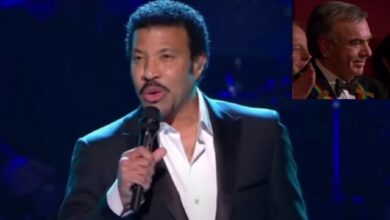Unable To Form Sentences, Sang Oh, My. 46 Years Later, It Still Echoes
Elvis Presley, often referred to as the “King of Rock and Roll,” played a pivotal role in shaping the landscape of popular music and culture. Born on January 8, 1935, in Tupelo, Mississippi, Presley grew up in a modest household, which influenced his artistic spirit and work ethic. As a child, he was exposed to gospel music at church and the rich sounds of rhythm and blues from the local radio stations, laying the groundwork for his future musical endeavors. The energy and emotion found in these genres resonated deeply with him, which he later translated into a unique sound that would captivate audiences around the world.
Presley achieved his first major break in 1954 when he recorded “That’s All Right” at Sun Studio in Memphis, Tennessee. This song is widely considered the catalyst for the rock and roll movement. His dynamic blend of blues, country, and pop, alongside his charismatic stage presence, quickly set him apart from his contemporaries. Elvis’s early hits like “Heartbreak Hotel,” “Hound Dog,” and “Jailhouse Rock,” coupled with his energetic performances, made him a sensation, and he soon became a household name.
As his career progressed, Presley not only dominated the music charts but also ventured into the film industry. He starred in numerous movies throughout the 1960s, including “Love Me Tender,” “Blue Hawaii,” and “Viva Las Vegas.” These films, showcased alongside his musical talents, reinforced his status as a cultural icon. However, he faced increasing pressure as the years went on, grappling with the expectations placed upon him by his fans, media, and management.
By the 1970s, the challenges that had been factoring into his life began to manifest more prominently. The pressures of fame, along with personal struggles such as his divorce from Priscilla Presley in 1973, led him down a tumultuous path marked by health issues and substance abuse. Despite these difficulties, Elvis maintained an unwavering connection with his audience. His concerts during this time were often marked by a mix of nostalgia and vulnerability, giving fans a glimpse into the man behind the legend.
When reflecting on his final performances, it’s evident that Elvis possessed an innate ability to evoke emotion, even when faced with physical ailments. The two concerts filmed in June 1977, which later aired in a television special, serve as a bittersweet reminder of his artistry. Although critics labeled the show as showcasing a diminished version of the performer, many fans recall the moments that revealed Presley’s passion and dedication to his craft. His ability to pour his heart into each song, like during the poignant “Are You Lonesome Tonight?,” allowed audiences to connect with him on a personal level.
Elvis’s friendship with individuals such as Jerry Schilling reveals another layer to his complex character. Schilling’s accounts offer insights into the challenges the singer faced, highlighting how his inner circle was aware of his struggles yet supported him through his choices. Elvis’s desire to continue performing despite declining health demonstrated not only his commitment to his audience but also his deep-rooted need for music as a source of solace and expression.
In the wake of Presley’s sudden death in August 1977, his influence has only grown. His music transcended generations, influencing countless artists across various genres. The emotional weight of his last performances resonates with fans, who often reflect on their experiences with his music as both a reflection of their own lives and the spirit of a beloved entertainer. The legacy of Elvis Presley is not confined to his chart-topping hits; it exists in the way his music continues to inspire creativity, emotion, and celebration of life.
As time moves forward, discussions surrounding Elvis often include an examination of not only his accomplishments but also the sobering truths about fame, health, and the human experience. His story serves as a poignant reminder of the complexities faced by those in the public eye, and how the pursuit of success can intertwine with personal challenges. Today, exhibitions and tribute events across the globe celebrate his music and life, reaffirming his status as an irreplaceable figure in entertainment history.
Furthermore, as technology and social media advance, fan interactions with Presley’s music have become even easier and more profound. Various platforms allow listeners to share their thoughts, stories, and tributes, creating a vibrant community around Presley’s enduring legacy. Even decades after his passing, the spirit of Elvis lives on through these fan interactions, demonstrating the universal nature of his appeal.
In conclusion, Elvis Presley’s life and career encapsulate the journey of a man who rose to monumental heights while grappling with the human experience. His music, characterized by emotional depth, remains accessible to all, bridging gaps across time and culture. Whether through heartfelt ballads or energetic rock and roll tracks, the essence of Elvis continues to touch the hearts of fans around the world, solidifying his place not only as a musical innovator but also as a symbol of the complexities and beauties of life itself.
&ab_channel=rosikalau





